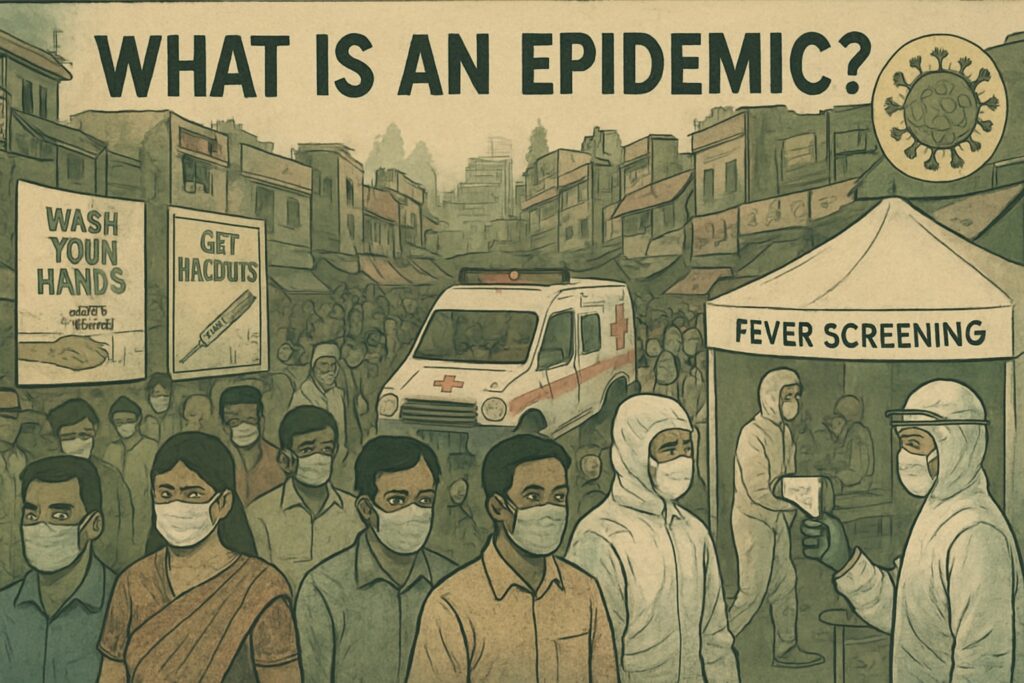An epidemic is the rapid spread of a disease to a large number of people within a short period in a specific area or population. India, with its large population and diverse geography, has faced several major epidemics throughout history. These health crises have impacted millions, straining the healthcare system and highlighting the importance of public health infrastructure and disease control.

Table of Contents
What is an Epidemic?
An epidemic occurs when the number of cases of a disease exceeds the normal expected levels in a community or region. If it spreads globally, it becomes a pandemic.
Causes of Epidemics
- Infectious Diseases: Caused by bacteria, viruses, or parasites (e.g., cholera, dengue).
- Poor Sanitation: Leads to the spread of water-borne and vector-borne diseases.
- Overcrowding and Urban Slums: Increases person-to-person transmission.
- Climate Conditions: Monsoons and humid climates can promote the growth of disease vectors like mosquitoes.
- Poor Public Health Awareness: Delayed diagnosis and treatment.
- Global Travel and Migration: Spreads diseases across regions.
Major Epidemics in India
| Year | Disease | Region Affected | Impact |
|---|---|---|---|
| 2020–2021 | COVID-19 | Nationwide | Over 4 crore cases and 5 lakh+ deaths |
| 1994 | Plague | Surat, Gujarat | Panic, mass migration, 50+ deaths |
| 2006 | Chikungunya | Southern India | Over 1 million cases |
| 2009 | H1N1 (Swine Flu) | Maharashtra, Delhi, others | Thousands infected, hundreds of deaths |
| 1817–1947 | Cholera Pandemics | Bengal, across India | Millions died in multiple outbreaks |
Common Epidemic Diseases in India
- Cholera – Water-borne disease, spreads due to contaminated water.
- Dengue and Chikungunya – Spread by Aedes mosquitoes during and after monsoon.
- Malaria – Caused by Plasmodium, spread by Anopheles mosquitoes.
- Typhoid – Spread through food and water contaminated with Salmonella bacteria.
- Swine Flu (H1N1) – Respiratory illness that spreads through human contact.
- COVID-19 – Global viral pandemic caused by the SARS-CoV-2 virus.
Impact of Epidemics
- Loss of life
- Economic disruption
- Closure of schools, markets, and public places
- Strain on healthcare systems
- Psychological trauma and fear
- Migration and social stigma
Government Response to Epidemics
- Surveillance and Early Detection:
- Integrated Disease Surveillance Programme (IDSP)
- Monitoring by National Centre for Disease Control (NCDC)
- Health Infrastructure Development:
- Setting up isolation wards, fever clinics, and dedicated hospitals.
- Training of health workers.
- Vaccination Programs:
- Polio eradication drive
- COVID-19 vaccination campaign
- Awareness Campaigns:
- Promoting hygiene, mask-wearing, mosquito control, and sanitation.
- Legislation:
- Epidemic Diseases Act, 1897
- Disaster Management Act, 2005 (used during COVID-19)
Preventive Measures
- Ensure clean drinking water and sanitation
- Promote hand hygiene and safe food practices
- Use mosquito nets and repellents
- Early diagnosis and timely vaccination
- Maintain social distancing during outbreaks
Conclusion
Epidemics have been a recurring health challenge in India. While medical science and government preparedness have improved, densely populated and under-resourced areas remain at high risk. Public awareness, improved health systems, early detection, and community participation are key to managing and preventing future outbreaks. Learning from past epidemics, especially COVID-19, India continues to strengthen its capacity to handle health emergencies.
Read: Geography Notes